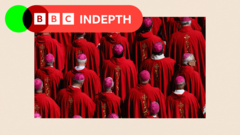As the cardinals assemble at the Santa Marta guesthouse, the legacy and influence of Pope Francis shape the dialogue. His 12-year tenure and the appointment of roughly 80% of the voting cardinals weigh heavily on deliberations about the Church's direction. The conclave represents the most diverse gathering of cardinals to date, bringing together voices from around the globe with varying priorities influenced by regional challenges. This diversity has created both opportunities and tensions as cardinals grapple with differing interpretations of Pope Francis’s reforms and their implications for future leadership. With a mix of continuity and innovation in mind, the question remains: who will emerge as the successor capable of unifying the Church's conflicting perspectives?
The Vatican's Tensions and Expectations as Cardinals Gather for Conclave

The Vatican's Tensions and Expectations as Cardinals Gather for Conclave
Behind the scenes at the Vatican, cardinals prepare for a significant conclave to select the next Pope, amid dynamic discussions about the future of the Church.
In the days leading up to this historic conclave, cardinals have been engaging in general congregations to share their views and priorities. This pre-conclave dialogue has highlighted the stark differences in regional needs—contrasting the European focus on revitalizing dwindling congregations with the pressing social issues of poverty and conflict faced by African and Asian nations.
The papal role extends beyond its spiritual responsibilities; it carries the weight of a statesman tasked with addressing both faith and global influence. Pope Francis used his position to advocate for marginalized voices worldwide, positioning the Church as a powerful entity in global discourse. However, his tenure also faced significant criticism from traditionalists concerned about deviations from long-standing Church doctrine, creating a need for clarity in future leadership.
Selecting the next Pope will inevitably involve navigating a landscape marked by both the desire for continuity of Francis’s inclusive vision and the skepticism about how those changes will be administered. Balancing distinct regional concerns, the new leader must rise to the challenge of fostering unity amid diversity within a Church that seeks to be relevant in today's complex social landscape.
As the cardinals prepare to cast their votes in the Sistine Chapel, they will be called to transcend personal biases and yield to divine guidance in their decision-making, striving to find a leader capable of carrying forward the mission of a Church that connects with the struggles of people across the globe.
The papal role extends beyond its spiritual responsibilities; it carries the weight of a statesman tasked with addressing both faith and global influence. Pope Francis used his position to advocate for marginalized voices worldwide, positioning the Church as a powerful entity in global discourse. However, his tenure also faced significant criticism from traditionalists concerned about deviations from long-standing Church doctrine, creating a need for clarity in future leadership.
Selecting the next Pope will inevitably involve navigating a landscape marked by both the desire for continuity of Francis’s inclusive vision and the skepticism about how those changes will be administered. Balancing distinct regional concerns, the new leader must rise to the challenge of fostering unity amid diversity within a Church that seeks to be relevant in today's complex social landscape.
As the cardinals prepare to cast their votes in the Sistine Chapel, they will be called to transcend personal biases and yield to divine guidance in their decision-making, striving to find a leader capable of carrying forward the mission of a Church that connects with the struggles of people across the globe.




















